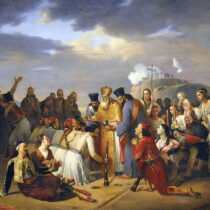Human rights are a major issue in our social and political debates, therefore their definition and safeguarding must comprise the climax of democracy and humanitananism and be the prime pursuit of civilization. This article is a concise reference to the course of human rights from the Magna Carta of 1215 to the Universal Declaration of Human Rights of the UN and the relevant European Convention. Its purpose is to make clear the approach of a different society, such as the Athenian, and also to show the singificance of that society’s contribution to the present reality of human rights. Human rights in Athens of the fifth and fourth century BC were safeguarded by the democratic regime, which typically was founded with Solon’s legislation, but essentially started funcioning under Klesthenes’ reformations, and reached its culmination with the so-called Pericles’ “μισθοφορία”.
Seven units are examined in this article:
1. The rights and obligations of the free citizens, the status and content, that is, of the term “Citizen” in antiquity.
2. Women’s rights. Although they represented half of the population of the free citizens they were treated as the juvenile of the ancient Greek society, because in all their life they firmly depended on a “master”, who was entitled to exercise a strict patronage.
3. The rights of children, mainly boys, during their adolescence.
4. The rights of metics, the immigrants, that is, who were permanently settled in Athens.
5. The limited rights of slaves. They were divided into private and public slaves and, depending on their occupation, into slaves of fields, homes, workshops, mines; the slaves who worked in their own premises comprised a separate category. The conditions under which they could gain the free status are also numbered here.
6. The rights of the hetaerae, this particular kind of prostitute, who were usually someone’s concubine for a certain period.
7. Opinions, arguments and declarations of intellectuals, especially sophists, that represent the most advance humanistic ideas of the ancient world and are more progressive than the Christian attitude and theories of St. Paul and other apostles regarding women or slavery.

